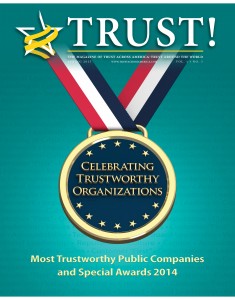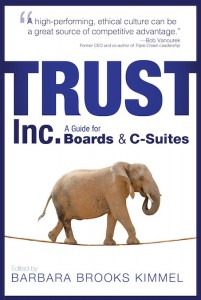It’s no secret that trust is either completely ignored or taken for granted in most organizations. In fact, usually its a pattern of systemic low trust, followed by a crisis, for the word “trust” to even make its way on to the organization’s radar. And then the wrong question is asked. How do we “rebuild” trust (even though it never existed)? What a mess.
Why is this? These are the 5 most common excuses for ignoring trust:
- Boards and C-Suites (in most organizations) have never considered trust as a business imperative or strategy.
- Organizational trust is mistaken for compliance which is confused with ethics.
- Organizational trust cannot be regulated. It’s voluntary.
- When a trust breach occurs, often the punishment doesn’t fit crime so there is little deterrent for repeating the “crime.”
- Trust is soft and can’t be measured. And that which can’t be measured, can’t be managed.
It’s #5 that perhaps bears the least weight. There are numerous measurements of organizational trust and trustworthiness. Trust Across America-Trust Around the World has aggregated 5 years of data proving the Return on Trust in public companies. Other global trust experts have validated assessment tools measuring the most important indicators of qualitative trust in leaders, teams, employees, etc.
Organizations choosing to be proactive about trust must turn over the right rock to find the help they need. It doesn’t come from legal, compliance, risk, crisis management, CSR, sustainability, marketing or traditional leadership expertise. The only way to craft a trust-building strategy that “sticks” is by having the right people do it, and those are trust experts, no one else.
Taking trust for granted is like breathing…until the heart attack makes it impossible. Then the victim tries to find the best Band Aid to temporarily stop the disease when it could have been totally avoided. Leaders who choose to be proactive about trust have a huge advantage over their competitors. All the excuses in the world won’t change that.
Have you answered our June “Pulse” on Trust question? Today is the last day to vote. It will take no more than 30 seconds.
Barbara Brooks Kimmel is the Executive Director of Trust Across America-Trust Around the World whose mission is to help organizations build trust, and runs the world’s largest membership program for those interested in the subject. She is also the editor of the award winning TRUST INC. book series and the Executive Editor of TRUST! Magazine. In 2012 Barbara was named “One of 25 Women Changing the World” by Good Business International.
Our annual poster, 52 Weeks of Activities to Increase Organizational Trust is available to those who would like to support our work by making a small donation.
Did you know we have published 3 books in our award-winning TRUST Inc. series. They are yours when you join our Alliance.
Copyright 2015, Next Decade, Inc.






Recent Comments